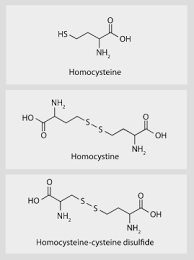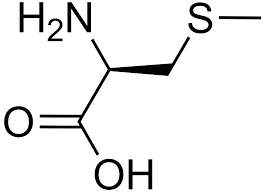The Effects Of Elevated Homocysteine Levels On Health And Well Being
What Is Homocysteine?
Homocysteine is an amino acid byproduct resulting from protein breakdown via metabolism. Escalated levels of Homocysteine in the bloodstream are associated with a heightened stroke and heart attack incidence.
 Medical researchers are still unsure of the exact reasons for this increased risk. Still, it's hypothesized that high concentrations of Homocysteine adversely affect arterial walls, leading to damage that encourages the formation of dangerous plaque. It's also believed that excess Homocysteine can impact blood platelet composition, potentially leading to problems related to the creation of clots.
Medical researchers are still unsure of the exact reasons for this increased risk. Still, it's hypothesized that high concentrations of Homocysteine adversely affect arterial walls, leading to damage that encourages the formation of dangerous plaque. It's also believed that excess Homocysteine can impact blood platelet composition, potentially leading to problems related to the creation of clots.
At this point, researchers don't know whether high homocysteine levels increase the risk of cardiovascular disease. It's possible that elevated Homocysteine levels are a byproduct of some other factor that increases cardiovascular risk or may also be a warning sign of existing issues without directly contributing to the damage.
This is similar to how Elevated levels of Prostate-Specific Antigen (PSA) are a warning sign of Prostate Cancer but do not actually contribute to cancer risk.
We're still learning a lot about how Homocysteine Levels affect health, but it's also hypothesized that high Homocysteine Levels may double the risk of Alzheimer's Disease among aging individuals.
Who Is Most Likely to Experience High Homocysteine Levels?
Elevated Homocysteine Levels are generally the result of diet. Diets high in meat and low in veggies and fruits tend to produce the highest Homocysteine Levels. High animal protein intake creates lots of Homocysteine, and the absence of B Vitamins (including folic acid) slows down the rate at which the body can evacuate Homocysteine from the blood.
The human body can also produce its Homocysteine. Methionine is comprised of a methyl group attached to a Homocysteine molecule. Methionine  promotes cellular reactions by donating its methyl group to other molecules, which leaves an independent Homocysteine.
promotes cellular reactions by donating its methyl group to other molecules, which leaves an independent Homocysteine.
Vitamin B6 and Folic Acid reduce Homocysteine Levels by giving a methyl group to Homocysteine, restoring it to Methionine.
While there is some sort of correlation between elevated Homocysteine Levels and cardiovascular issues, there is no overwhelming evidence that high Homocysteine contributes to an increased risk of stroke and heart disease.
Study Shows No Link Between Homocysteine Gene Mutation and Heart Disease
In 2012, a broad study was published in the Public Library of Science which evaluated Homocysteine's influence on heart disease risk. This study collected the medical information of 116,000 patients that had received genetic testing regarding the presence of a genetic mutation that leads to increased Homocysteine Levels.
They found that individuals with this particular mutation had 20% higher levels of Homocysteine than those without it. Despite these increased Homocysteine Levels, the subjects experienced no elevated risk of Heart Disease.
On the other hand, a single study does not breed a consensus. Another study released in 2006 by the New England Journal of Medicine found that women struggling with heart disease experience quadruple the mortality risk compared to women with normal levels of Homocysteine.
While the risk associated with elevated Homocysteine Levels is apparent, no conclusive evidence was provided by the study which could blame Homocysteine for Heart Disease. In the 2012 survey, high Homocysteine Levels could be a symptom of Heart Disease rather than a contributing factor.
Symptoms of High Homocysteine Levels
Elevated Homocysteine Levels are not known to contribute to any adverse health symptoms directly. However, Vitamin B12 Deficiency (which leads to an increase in Homocysteine Levels) is associated with symptoms such as dizziness, fatigue, and pale skin. Some medical issues are related to Elevated Homocysteine, though it's likely not the root cause.
These conditions include Alzheimer's, Dementia, Stroke, Coronary Artery Disease, Heart Attack, Blood Clots, Atherosclerosis, and Osteoporosis.
What Leads to Increased Homocysteine Levels?
While the body's internal mechanisms impact your Homocysteine Concentrations, other factors associated with diet and medication affect Homocysteine Levels. If your Folic Acid Intake is less than 400 mcg daily, your risk of High Homocysteine Levels increases. Regular coffee drinkers are more likely to test positive for elevated Homocysteine Levels, as are individuals who suffer from high-stress levels.
Stress increases Homocysteine Concentrations because it releases norepinephrine and epinephrine, both of which borrow methyl groups from methionine. If you're under a lot of pressure, you should strongly consider increasing your Folic Acid intake. Thyroid Deficiency can also lead to increased Homocysteine, psoriasis, and kidney disease.
How Are Homocysteine Levels Evaluated?
Homocysteine Levels can be analyzed via a blood test. While these blood tests aren't commonly performed, they can benefit certain at-risk patients. Individuals at elevated risk for Heart Disease are sometimes tested for underlying Homocysteine Concentrations. The normal range for Homocysteine is from 4.4-10.8 umol/l.
What Can Be Done to Regulate Homocysteine Levels More Effectively?
The best ways to control Homocysteine are to manage stress and eat lots of foods high in B Vitamins. Some great options for folic acid include folate derived from beans, orange juice, and green vegetables.
A quality multivitamin is an intelligent choice to shore up any B-Vitamin Deficiency caused by diet. You should choose a supplement that provides at least 400mcg of folic acid. You may also opt to reduce your consumption of animal protein to control your Homocysteine Levels.
least 400mcg of folic acid. You may also opt to reduce your consumption of animal protein to control your Homocysteine Levels.
Many have found it highly beneficial to take a day or two off per week from meat consumption or simply limit your daily animal protein intake.
While there's little evidence that Homocysteine Levels lead to adverse health outcomes among patients, controlling your Homocysteine Concentrations does have ancillary benefits because these changes reduce your risk factors for other conditions that can negatively impact your health, even though the reduction in Homocysteine Levels may be an arbitrary benefit.
- What Is The Difference Between Health And Wellness? [Last Updated On: January 18th, 2025] [Originally Added On: November 26th, 2020]
- What Is Human Growth Hormone [Last Updated On: January 18th, 2025] [Originally Added On: November 27th, 2020]
- Types Of Psoriasis Treatment [Last Updated On: January 17th, 2025] [Originally Added On: November 28th, 2020]
- Are Hgh Anti-aging Claims Legitimate? [Last Updated On: January 15th, 2025] [Originally Added On: November 30th, 2020]
- Popular Herbicide Atrazine A Major American Health Risk [Last Updated On: January 16th, 2025] [Originally Added On: December 1st, 2020]
- The Influence Of Patent Law On Generic And Patented Medications [Last Updated On: January 15th, 2025] [Originally Added On: December 2nd, 2020]
- How Does Hgh Keep You Young? [Last Updated On: January 14th, 2025] [Originally Added On: December 4th, 2020]
- Hgh Honesty A Hallmark Of Indians Pitcher Byrds First Book [Last Updated On: January 14th, 2025] [Originally Added On: December 5th, 2020]
- How Does Growth Hormone Deficiency Testing Work? [Last Updated On: January 13th, 2025] [Originally Added On: December 6th, 2020]
- Hgh Benefits [Last Updated On: January 12th, 2025] [Originally Added On: December 7th, 2020]
- Four Best Ways To Boost Hgh Levels [Last Updated On: February 17th, 2025] [Originally Added On: December 8th, 2020]
- Can Laughter Boost Hgh Production? [Last Updated On: February 19th, 2025] [Originally Added On: December 9th, 2020]
- Can Hgh Reverse The Damage Of Drug Addiction? [Last Updated On: January 11th, 2025] [Originally Added On: December 10th, 2020]
- Bio-identical Hgh And Testosterone For Andropause [Last Updated On: January 10th, 2025] [Originally Added On: December 11th, 2020]
- Lifting Weights Increases Growth Hormone and Testosterone! [Last Updated On: February 16th, 2025] [Originally Added On: June 26th, 2021]
- How Can I Check Out the Credentials of a Physician Before Getting HRT? [Last Updated On: March 8th, 2025] [Originally Added On: February 1st, 2023]
- What is the Age Profile of Adult-Onset HGH Sufferers? [Last Updated On: August 1st, 2024] [Originally Added On: June 4th, 2023]
- Introduction: Importance of Checking a Physician's Credentials [Last Updated On: March 4th, 2025] [Originally Added On: March 4th, 2025]
Word Count: 924







